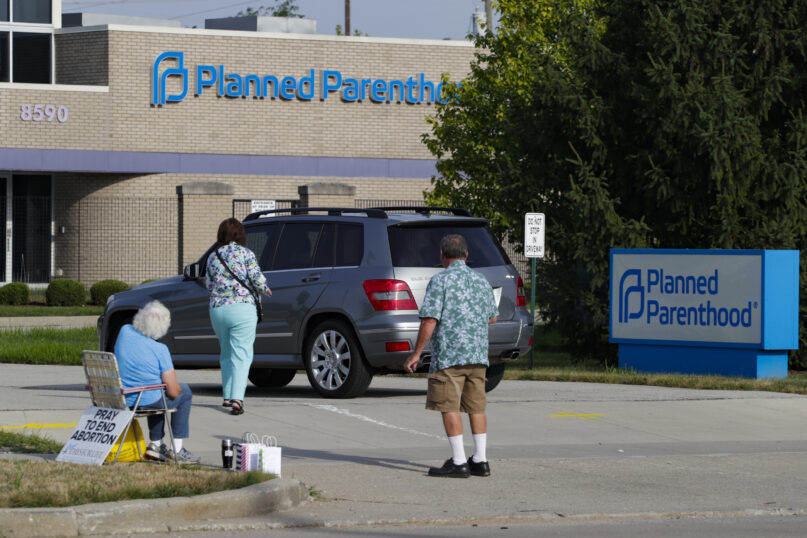Will the US Supreme Court recognize a religious right to abortion?
We’ll find out soon enough.

(RNS) — In August, Indiana radically curtailed the ability to procure an abortion. Where prior law, based on Roe v. Wade, permitted abortions up to 22 weeks of pregnancy, now the procedure will only be allowed if the pregnant person’s serious health or life is at risk. If there is a lethal fetal anomaly, Indiana’s new law permits abortion up to 20 weeks post-fertilization; in cases of rape or incest, up to 10 weeks.
A judge ruling in a lawsuit filed in September by the ACLU of Indiana has blocked the new restrictions from going into effect pending resolution of the ACLU’s claim that the law violates the state’s constitution. But it is a second ACLU lawsuit that is of interest to us here. Filed on behalf of Hoosier Jews for Choice and five anonymous plaintiffs of different faiths, it argues that the near-ban on abortion also violates the state’s Religious Freedom Restoration Act, which then-Gov. Mike Pence signed into law in 2015.
Like other RFRAs, Indiana’s stipulates that “a governmental entity may not substantially burden a person’s exercise of religion… [unless it] (1) is in furtherance of a compelling governmental interest; and (2) is the least restrictive means of furthering that compelling governmental interest.” The plaintiffs claim their religious beliefs entitle them to obtain abortions in circumstances forbidden by the new Indiana law.
After hearing oral arguments last week, Marion County Judge Heather Welch asked both sides to submit additional written arguments by this Friday. In the meantime, let’s consider the situation of Anonymous Plaintiff #1, a 39-year-old Jewish woman.
RELATED: 3 Jewish women file suit against Kentucky abortion bans on religious grounds
She belongs to a synagogue, participates in a variety of Jewish communal activities, observes the Jewish holidays and keeps a kosher diet by not eating pork or shellfish and not mixing milk and meat. This would seem to be sufficient evidence that (as religious free exercise jurisprudence requires) her “Jewish belief that life begins when a child takes its first breath after being born” is sincerely held.
After having one child, Anonymous Plaintiff #1 got pregnant again and found, through genetic testing, that the fetus had a severe nonhereditary chromosomal defect — a defect that, 95% of the time, results in the fetus being either miscarried or stillborn. No more than 10% of children born with this defect survive beyond 12 months and those that do have severe physical and cognitive disabilities and are never able to walk or talk.
Last March, the woman obtained a legal abortion as permitted by then existing Indiana law and in accord with her religious beliefs — because the pregnancy “put at risk [her] physical, mental, and emotional health and wellbeing during the pregnancy and would have continued to do so if she had allowed it to continue to a miscarriage, stillbirth, or live birth , although it would not have resulted in her death or caused a serious risk of substantial and irreversible physical impairment to a major bodily function and may not have resulted in the child dying within three months of birth.”
In other words, the abortion permitted by Indiana’s old law would be forbidden under its new one. As a result, although the woman and her husband would like to try to have another child, she is refraining from becoming pregnant because there is a 1-in-30 chance that the genetic defect would recur.
“Plaintiffs use religious beliefs to demand medical intervention to end human life,” declared Indiana Attorney General Theodore Rokita in his response to the suit. “The State is aware of no case in America holding that a religious belief entitles someone to medical intervention of any kind, much less intervention that ends human life.”
RELATED: Blowing shofars, Jewish lawmakers, rabbis hold abortion rights ‘sho-test’
What Indiana’s restrictive new abortion law does do is permit medical intervention that, in Rokita’s terms, “ends human life” in certain limited circumstances. The question is whether the enhanced religious liberty rights provided by Indiana’s RFRA should allow for an expansion of those circumstances.
RFRAs have been recognized by the U.S. Supreme Court as allowing a range of exemptions from existing laws, including those banning discrimination and requiring contraceptive coverage. During the COVID-19 pandemic, the court became highly deferential to religious claims for exemptions from church in-person attendance regulations.
Would any of the staunchly pro-religion justices who voted to overturn Roe v. Wade recognize a religious right to abortion? I’m guessing this will be where they draw the line on religious liberty.
No comments:
Post a Comment